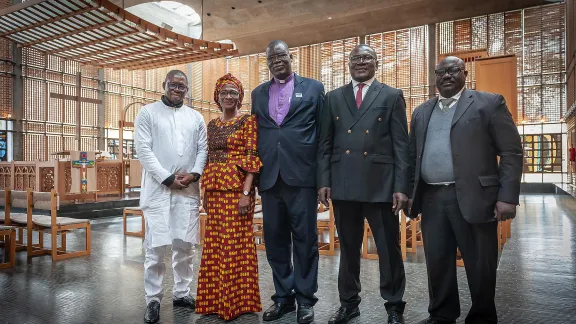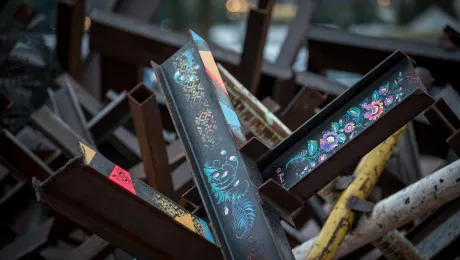
Delegation members of the Nigerian civil society coalition. Photo: LWF/S. Gallay
LCCN and civil society groups seek intervention on human rights’ violations in Numan Federation
(LWI) - Representatives of a Nigerian civil society coalition from the Numan Federation have called on United Nations (UN) member states to exert more pressure on the government to end deadly attacks between farming communities and armed Fulani herdsmen.
The Lutheran World Federation (LWF) is hosting the delegation whose members are drawn from the Adamawa United Forum (AUF) and the Lutheran Church of Christ in Nigeria (LCCN). Today, the group will attend the universal periodic review (UPR) of Nigeria at the UN Human Rights Council in Geneva.
The Nigerian government faces allegations of failing to protect farmers in the country’s northern and central regions. The long-standing conflict pits the nomadic Fulani herders against the indigenous people of the Numan Federation.
Led by LCCN Bishop Dr Peter Bartimawus, the delegation includes former LWF Council member and AUF coordinator Titi Malik, lawyer Leonard Nzadon, historian Dr Giscard Norris Stanley and LCCN staff member Felix Samari.
In the last two years, attacks by Fulani herdsmen have escalated. Stanley said he lost 26 members of his family in February and Nzadon lost two brothers. Since 2016, Over 500 people have been killed from both sides, the most recent being 30 in Lamurde area in October.
Impunity to perpetrators
Adamawa State has a population of 4.3 million people, out of whom 123,000 live in the ethnically diverse Numan Federation, where many of the attacks take place, and where LCCN has its headquarters. The delegation said the government’s response is biased in favor of Fulani herdsmen and accuse the authorities of offering impunity to perpetrators.
Were it not for the church, human suffering would be much higher. “The government gives sanctuary to the Fulanis [mostly Muslim] but the indigenous people rely on the church. Church organizations provide the greatest response,” Nzadon added.
According to the delegation, the herdsmen are supported by groups from other countries and are heavily armed. They seek water spots for cattle but as the encroaching Sahara Desert dries up pastoral land, they seize land from farmers, often killing and raping women in the process. The harvesting is interrupted, and consequently food shortages loom.
The UN Office for the Coordination of Humanitarian Affairs has described the crisis in Nigeria's northeast as one of the most severe in the world, with 7.7 million people needing humanitarian assistance in 2018 in the worst-affected states including Adamawa.
“Let the government be governed by the law”
In Geneva, members of the civil society coalition visited missions of governments that provide development support to Nigeria, asking them to insist the country obey its own rules.
Let the government, which established the law, be governed by the law. Let the law be respected and engender confidence in the populace.
“Let the government, which established the law, be governed by the law. Let the law be respected and engender confidence in the populace,” Nzadon said. One of the issues raised during their advocacy meetings was Nigeria’s obligation to fulfil its federal constitution. They gave the example of appointments to public decision-making bodies and security forces, saying the government does not abide by the requirement that members of such entities represent all states and ethnic groups.
Traumatic impact on women and girls
They noted churches were the single largest group providing support to victims of violence in the area. The LCCN gives relief materials to cushion the effects of suffering brought about by the crisis, Malik said. “When the herders attack villages, many women become widows and children orphans as a result. It’s the church that first comes to give support and assistance. As there is no protection, the women, who are also farmers, are sexually abused. Some are abducted and some are still missing. Many have died. Some are still going through trauma today.”
She said girls are abducted on their way to school, with some kidnappers demanding ransom before releasing them. Some girls are killed, however, and some die as a result of the sexual abuse meted out on them, she added.
Samari said five dioceses of the Lutheran church are affected, with the entire Todi Diocese worst hit. “If you hear of anyone injured in that diocese or killed, if you hear of any church being destroyed, they will be LCCN. LCCN bears the brunt of these clashes,” he noted.
Prophetic voice
The people of Numan are now faced with a food shortage as farmers have been unable to plant. Host communities are also suffering.
Malik called upon the Lutheran communion for prayer. “It is good that the members of the communion and the church have not relented or given up as a body of Christ and have continued to pray and work for peace in the area.”
The church provides relief to both Muslims and Christians affected by the conflict. “Despite the fact that the church has borne the brunt of this, it has extended the hand of friendship and prophetic voice that we must be our brothers’ keeper. This has not changed. In prayers, we must make sure those suffering do not feel isolated,” Malik added.
The LWF Council issued a resolution condemning the violence, at its meeting in July.


